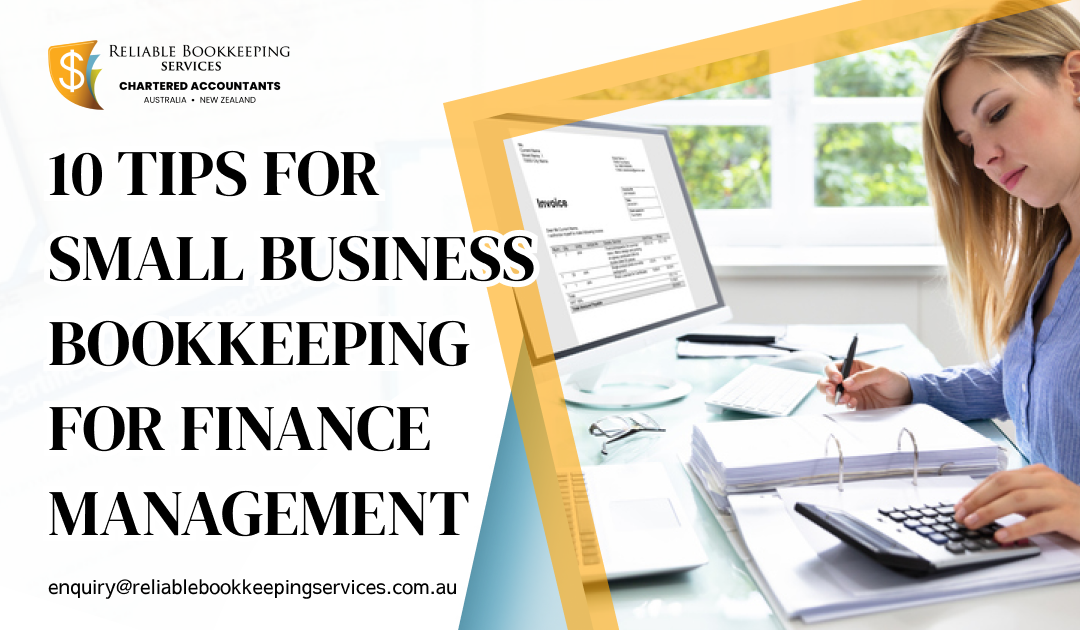The success of any business depends on how its finances are organised. The person who is responsible for managing business finances is known as a bookkeeper. Bookkeeping for small business is important to manage business finance and keep records up-to-date so whenever a business owner wants to access the data, then he/she can easily access it. Bookkeepers ensure business records are updated, and financial statements are accurate. In addition to this, they also ensure the business stays stable and grow more with measures, assessments, deductions, and advice.
Bookkeepers wear multiple hats and work continually to keep the company on the right path to success. If you are a startup, then it is your new beginning, and you should hire a reliable bookkeeper to grow your business further.
10 Tips for Small Business Bookkeeping to Keep Your Business Books on the Top
Here are a few bookkeeping tips that will help you keep your business books organised and up-to-date:
- Analysis of Business Performance
Bookkeepers not only track the financial transactions of a business but also assess business performance. They compare the actual spending with the predicted budget for the quarter. In this way, bookkeepers can assess the progress of the company and analyse its ability to reach long-term goals.
If your business is not able to meet its planned revenue, then bookkeepers of Melbourne can suggest different ways to make it happen. In this way, you will have a clear idea of your business or project performance that is producing a good return on investment. - Access to Data
It is suggested that stakeholders, entrepreneurs, and the bookkeeper must have access to the financial data. It helps them to know the financial health of the business at a specific point, recognise fraud, review the latest reports, read the updated records, and check the historical data. Despite this, they can also check it on their phones or the computer without any stress with their authorised passwords. - Cash Flow Management
One of the most important responsibilities of the bookkeeper of Melbourne is to manage cash flow by invoicing and paying bills to avoid fines and late fees. The professional bookkeepers record incomings and follow up with clients to get payments. - Cost-Cutting Measures
Bookkeepers can help business owners to reduce redundant expenses. It allows you to minimise the cost of operations that will help you in minimising products price on offer.
In this way, the business can lure more buyers and maximise sales while keeping the expenses reduced. In the small business bookkeeping process, cost-cutting becomes an important part. - Keeping Track of All Cash Payments
Sometimes, business owners use small cash payments for spending without depositing to the business account. In turn, it can result in errors in business books and reports. A bookkeeper will ensure that every transaction should be added to the books, irrespective of how small a cash payment is. If you postpone the entry, then you may forget the exact amount or from where you got the money. - Payroll Tax Planning
Accountant Melbourne can help you with payroll tax planning. A professional will classify each employee, such as part-time employees, contract employees, and full-time employees. In addition to this, they also make sure that salaries are paid on time, and tax reporting is completed accordingly. - Creating a Budget Plan
Budgeting is a significant part of business planning that ensures the business is performing well according to the business strategy. It includes predicting the expenses, profits, and sales for a given period. The bookkeepers in Melbourne compare the projection work with the exact numbers achieved to analyse the business progress. - Accurate Record Organisation
Another most important responsibility of a bookkeeper is to stay on top of business books throughout the year. It indicates that all entries should be correct and must be sorted properly. - Correct Sales Invoicing
Delay or inaccuracy in invoicing can lead to errors in business books and cash flow issues. The bookkeeper in Melbourne will keep track of invoicing and take care of sending invoices when the project is done, or the goods are delivered to the customers. - Separating Personal and Business Accounts
The most important thing in bookkeeping is separating personal accounts from business accounts. Business owners must have separate personal and business accounts to avoid confusion. Otherwise, it will become difficult for you to identify expenses and income when you are using your personal account for business spendings.
Conclusion
All the tips mentioned above imply the importance of a bookkeeper in the business. If you haven’t hired bookkeeper and accounting services for your business, then you should hire these services to ensure the success of the business. Bookkeepers and accountants can manage various functions for a small business. They not only manage the finance of the business, but they also help with the performance and productivity of the business. For bookkeeping services, you can contact Reliable Bookkeeping Services provider.

